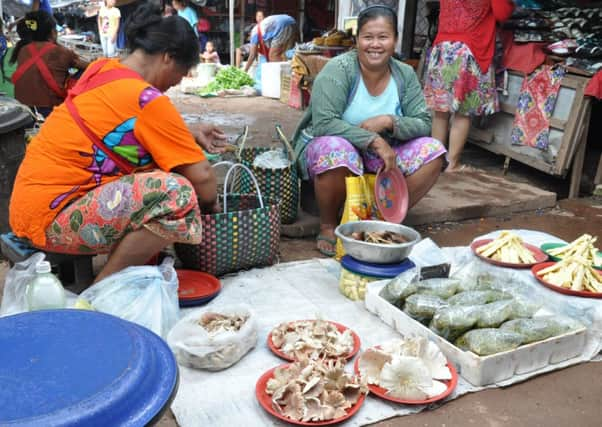Deadly or delicacy? Scottish fungi experts go East


Dr Andy Taylor, a fungal ecologist at the James Hutton Institute in Aberdeen, is leading an international initiative aimed at providing scientists in Laos with the expertise to identify its countless native mushroom species.
The south-east Asian country, where a third of the population lives on less than 75p a day, has a long history of using fungi for food and medicines, but traditional skills have been lost with growing urbanisation in recent generations.
Advertisement
Hide AdAdvertisement
Hide AdNowadays, a visit to any food market will turn up delicacies that could fetch up to £20 each nestled alongside highly poisonous specimens which could be fatal if eaten.
Official figures show around 15 people die as a result of consuming lethal varieties each year in the country, though the number is probably much higher.
“That shouldn’t be happening,” said Taylor, who is currently on the first of three visits to the country this year.
“They have a very long history of using forest products for food and medical products, but somewhere along the line the knowledge has become disjointed.
“Usually when there’s a long history, they know what’s edible and what isn’t. But for some reason that has broken down. We don’t know whether it’s with the pickers or the buyers or sellers or where.”
Around 75 per cent of the 6.5 million people living in Laos depend on fungi, mostly for their own tables but also to sell at home and abroad.
“They have local markets where you can pick up all sorts of things. But what’s for sale is actually scary, because on a single plate I’ve seen edibles, inedibles, poisonous, you name it.
“I would never eat wild mushrooms in a restaurant over there. I will be avoiding the mushrooms for sure – once they’re cooked they all look the same,” he said.
Advertisement
Hide AdAdvertisement
Hide AdThe three-year project is funded by a £250,000 grant from Defra’s Darwin Initiative and has academic partners in Belgium, Germany, Estonia and Denmark.
Much of the work will be centred in the capital, Vientiane, and surrounding areas, working with local science and forestry bodies and the International Union for Conservation of Nature.
After visiting the country, Taylor was surprised to discover there was no official education in mycology, the study of fungi. The team will organise workshops for students and workers in the industry.
He said: “Laos is amazingly rich in resources, but they have very little formal expertise in order to sustain and use these resources. Basically it’s about a knowledge exchange.
“One of the problems is identification – that’s my speciality. It’s a very exciting opportunity because it’s starting from scratch and there are lots of possibilities.”
A student from Laos will also come to Scotland for 12 months as part of a masters degree. They will attend a course at the Royal Botanic Garden Edinburgh (RBGE) and work on a project with Taylor in Aberdeen before returning to a teaching position at Laos university.
Another key aim is to establish a specialised laboratory in Vientiane. “As part of building up the infrastructure we’ve got money to set up a lab over there, a molecular lab, so that we can give them the expertise they need to keep the work going and bring things into the 21st century,” said Taylor. As well as sharing skills, the team aims to raise public awareness of the dangers of misidentifying fungi through poster campaigns at markets.
It’s hoped re-educating people in this lost art will help Laos maximise the rich pickings of its tropical monsoon forests. It’s an amazing resource they’ve got and there are huge biotechnology possibilities. The country could develop that as an industry, but it’s very much an unknown quantity what they have.”
Advertisement
Hide AdAdvertisement
Hide AdThere will be also studies of the Matsutake, a mushroom highly prized in Japan for its distinctive spicy smell. Top-quality specimens can fetch up to £1,200 a kilo, but there are fears it is being over-harvested.
Dr Mark Newman, a botanist at RBGE and key partner in the project, said mushroom-hunters from Japan charter planes and travel to the mountains where Matsutake are found.
“They use rakes to gather them from the deep litter of old pine needles where they grow,” he said. “But if you keep raking you break and kill the fungal threads and they won’t grow back.”
Dr Taylor added: “Normally you can pick mushrooms fairly easily and not do too much damage, but the way this one is picked can be detrimental. We’re actually making a case study of that – it’s a huge thing in Japan.
Matsutake are also used to flavour a local whisky, according to the Scot. “I tried it when I was over there but I’m not sure you can print what I thought of the taste.”